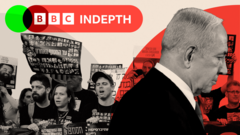Veteran journalist Jeremy Bowen’s recent journey across Israel has illuminated a nation grappling with unprecedented internal divisions, revealing how once-latent societal fault lines have escalated into profound chasms. His extensive conversations with Israelis from various backgrounds captured the starkly contrasting sentiments regarding current events, particularly concerning Gaza.
Bowen encountered individuals consumed by what he described as “psychological despair,” expressing deep anguish and opposition to the ongoing situation. Their perspectives reflect a significant segment of society deeply troubled by the humanitarian impact and the moral implications of their country’s actions. This group often voices profound concerns about the future trajectory of the nation and its place in the world.
In stark contrast, Bowen also spoke with many Israelis who articulated an overwhelming sense of justification for their country’s policies and military operations. For these citizens, the actions are seen as entirely necessary and legitimate, often framed through the lens of national security, defense, and the protection of their people. This segment views the government’s stance as a righteous response to existential threats and complex geopolitical realities.
Bowen’s reporting underscores that these are not minor disagreements but fundamental schisms, creating a deeply polarized national landscape. The divide extends beyond political affiliation, touching upon core values, perceptions of national identity, and the very future of Israel, suggesting a society struggling to find common ground amidst profound ideological rifts.



